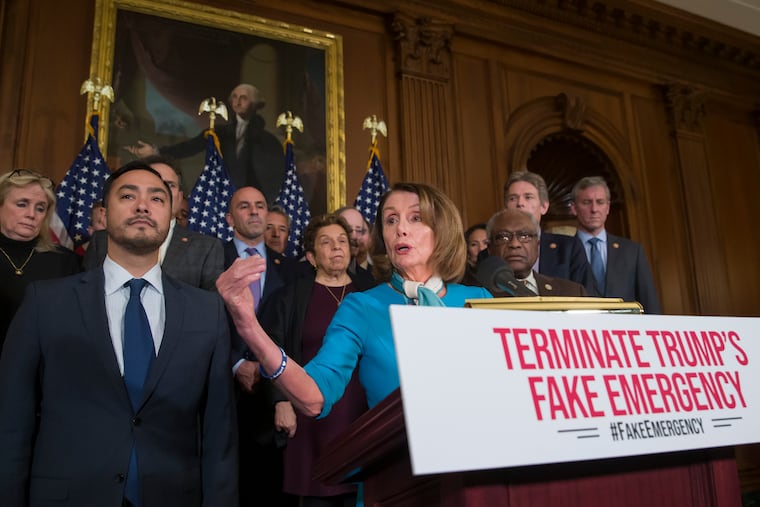How Democrats are challenging Trump’s national emergency declaration
President Donald Trump is doing everything he can to build a wall along the U.S.-Mexico border, while Democrats are doing everything they can to stop it.

President Donald Trump is doing everything he can to build a wall along the U.S.-Mexico border, while others are doing everything they can to stop it from happening.
The House of Representatives voted Tuesday to overturn the national emergency Trump declared earlier this month in an effort to secure funding for barriers along the border.
Congress has never looked to reject a president’s national emergency declaration since the National Emergencies Act was passed in 1976, according to the Washington Post. Though, the legislative body isn’t the only one in opposition.
Here’s how Trump’s national emergency declaration over the southern border is being challenged.
How and why is the national emergency declaration being challenged in Congress?
Declaring a national emergency gives a president wide-ranging and “greatly enhanced powers," according to the Brennan Center for Justice, a nonpartisan public policy and law institute. Trump is most interested in greater control over armed forces and military construction projects, according to the center.
» READ MORE: National emergency: What is it, and why did Trump declare one over the border?
On Feb. 15, Trump signed a funding bill that prevented another government shutdown but did not fulfill his request for $5.7 billion that would go toward building 200 miles of wall along the border. By declaring a national emergency at the same time, he hoped to side-step the lengthy process it takes to get laws passed in Congress to get the financial resources needed.
House Democrats introduced a resolution Friday to block the national emergency. House Speaker Nancy Pelosi called the move a “power grab by a disappointed President.”
“[President Trump’s] unlawful declaration over a crisis that does not exist does great violence to our Constitution and makes America less safe, stealing from urgently needed defense funds for the security of our military and our nation,” she said.
What happens next in the House and Senate?
As expected, the Democrat-controlled House passed the joint resolution Tuesday evening with a vote of 245-182. It now needs to be approved by the GOP-led Senate, where four Republican senators will need to cross party lines and vote in favor of stopping the declaration for it to pass. GOP Sens. Lisa Murkowski of Alaska, Susan Collins of Maine and Thom Tillis of North Carolina were looking as likely “yes” votes, The Hill reported Tuesday.
Should the Senate also pass the measure terminating the national emergency, Trump could step in with a veto. Congress could then throw out the veto, but only with a two-thirds vote in both chambers, and not enough congressional Republicans appear to be leaning toward blocking the declaration to overrule a veto.
Rep. Joaquin Castro, the resolution’s lead sponsor and a Democrat from Texas, said a veto would be mean an “uphill battle,” according to the Washington Post.
“We’re not going to give up," he said, according to the publication. "We’re going to keep fighting. And I’m hopeful.”
Trump has been vocal about using his veto powers if needed, and historically, Congress has overridden fewer than 10 percent of presidential vetoes, according to the Senate’s website.
On Monday, Trump tweeted out a plea to Republicans against the emergency declaration.
“I hope our great Republican Senators don’t get led down the path of weak and ineffective Border Security,” he wrote. “Without strong Borders, we don’t have a Country — and the voters are on board with us. Be strong and smart, don’t fall into the Democrats ‘trap’ of Open Borders and Crime!”
How else is the emergency declaration being challenged?
The declaration is being challenge not just legislatively, but legally, too. Sixteen states, including New Jersey and Delaware, filed a lawsuit last week, alleging that the move was unconstitutional.
“President Trump treats the rule of law with utter contempt,” said California Attorney General Xavier Becerra, according to the Associated Press. “He knows there is no border crisis, he knows his emergency declaration is unwarranted, and he admits that he will likely lose this case in court.”
Pennsylvania is holding off from joining the until it becomes clear whether Trump plans to use money appropriated for projects in the state, Attorney General Josh Shapiro said.
“I need to understand better where the money is coming from, whether or not it’s going to be taken from the people of Pennsylvania, the taxpayers,” Shapiro said. “I don’t have that information yet. So when I go to court to defend the interests of Pennsylvanians, I want to have the strongest possible case.”
» READ MORE: Should Pa. sue Trump over national emergency declaration? Democratic states are split."
Additional lawsuits have been filed by organizations like the American Civil Liberties Union and the Center for Biological Diversity.